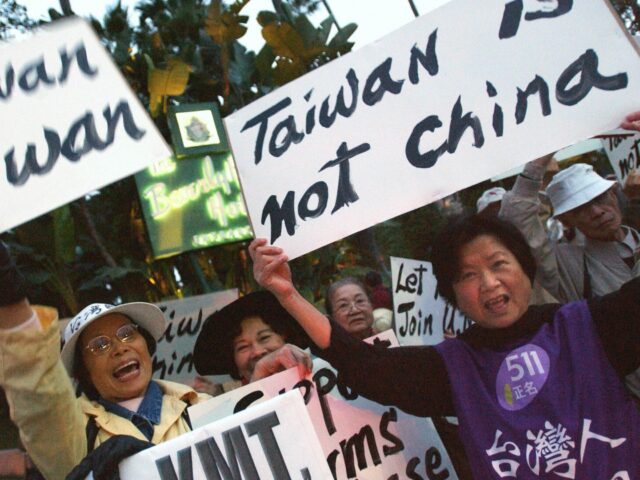The House of Commons has once again upstaged the Conservative government on Communist China, declaring on Wednesday that Taiwan is indeed an “independent country” as Foreign Secretary James Cleverly landed in Beijing.
In a direct repudiation of the CCP’s so-called “One China Policy”, a report published by Parliament’s Foreign Affairs Committee stated that “Taiwan is already an independent country, under the name Republic of China (ROC)”.
Since the Chinese Civil War, Beijing has maintained that there can only be one sovereign nation with the name ‘China’, the communist People’s Republic of China (PRC) of the mainland. With waning support from the West, Chiang Kai-Shek’s nationalists fled from Mao Zedong’s Red Army to the island of Taiwan in 1949 where it continued its Republic of China government, a descendent of which is still in power to this day. The island has also maintained an independent military, culture, currency, and written language from the communist mainland.
Although the CCP has never ruled over Taiwan, like other territories in the region, it has attempted to justify its claims to the island on questionable history, maintaining the questionable notion that China has controlled Taiwan for two millennia. The Foreign Affairs Committee noted, however, that while historical governments such as the Manchu Empire exerted control over the island, it was still for the most part self-governing even then.
Despite this, Beijing’s ‘One China’ policy has been the international status quo since U.S. President Jimmy Carter officially recognised the PRC communist government in 1978 and broke off official relations with Taiwan. The move from the “Mother of Parliaments” in Westminster to break with the mollycoddling policy towards the CCP is therefore not insignificant.
Stating that Taiwan’s sovereignty is “only lacking greater international recognition,” the Foreign Affairs Committee said: “Taiwan possesses all the qualifications for statehood, including a permanent population, a defined territory, government, and the capacity to enter into relations with other states.”
Communist China Backs World Economic Forum Acolyte Rishi Sunak to Replace Boris Johnson https://t.co/eTBGkVthXd
— Breitbart London (@BreitbartLondon) July 17, 2022
In comments to POLITICO, Chairwoman Alicia Kearns said of the committee’s declaration: “We acknowledge China’s position, but we as [the foreign affairs committee] do not accept it. It is imperative the foreign secretary steadfastly and vocally stand by Taiwan and make clear we will uphold Taiwan’s right to self-determination.”
“This commitment aligns not only with British values but also serves as a poignant message to autocratic regimes worldwide that sovereignty cannot be attained through violence or coercion,” Kearns added.
Beijing was unsurprisingly angered by the move, with Chinese Foreign Ministry spokesman Wang Wenbin branding the backing of Taiwanese sovereignty as “reversing right and wrong and confusing black and white.”
“China urges the British parliament to adhere to the ‘One China’ principle … and stop sending the wrong signals to pro-independence Taiwanese secessionist forces,” Wang added.
The Taiwanese welcomed Westminster for their endorsement, with Taipei’s Foreign Ministry saying: “We are grateful [for] the British parliament’s support for Taiwan’s status and international participation.”
Former UK PM Liz Truss to Travel to Taiwan, to the Chagrin of Communists in Beijing and Globalists in Londonhttps://t.co/dV7uvGqjFH
— Breitbart London (@BreitbartLondon) May 10, 2023
The proclamation of Taiwan’s rightful independence came at an inopportune time for the globalist-minded Conservative in name-only government of Prime Minister Rishi Sunak, which dispatched its top diplomat, Foreign Secretary James Cleverly to China, the first such high-level Sino-British meeting in over five years.
During the interim, relations have soured between the two nations over issues such as the persecution of religious and ethnic minorities in Xinjiang, the desecration of the freedoms guaranteed to the former UK colony of Hong Kong, and the continued impact of the Chinese coronavirus crisis. There are also increased fears following the Russian invasion of Ukraine that China may attempt to seize the island by force as well.
Cleverly, a Lieutenant Colonel in the British Armed Forces, said that he would raise issues of disagreement with his counterparts in Beijing, but maintained that it is critical for the UK to continue to engage with the communist country, to work together on areas such as the supposed climate crisis, disease prevention, and the war in Ukraine.
However, the Tory government has long had eyes on another goal; increasing trade ties with Beijing.
Some people didn’t want me to come to China.
Here’s why it matters. pic.twitter.com/IyBWVYnU2J
— James Cleverly (@JamesCleverly) August 30, 2023
Facing considerable backlash for his trip, the Foreign Secretary told the BBC following his meeting with Chinese Vice President Han Zheng that it would not be “credible” for the UK to disengage with the communist country, which currently remains Britain’s fourth largest trading partner.
Continuing the legacy of his Tory predecessors, Prime Minister Rishi Sunak has long-professed a desire to increase trade ties even further, so that the British economy could benefit economically off the backs of Beijing’s slave labourers. Sunak, who was essentially endorsed by Chinese state media to replace Boris Johnson for his “pragmatic” position on Chinese relations, has also backed away from plans to label the communist regime as a threat.
Considering the sensitive nature of the leadership in China, however, the move from the Parliament may spoil the attempts from government to foster better relations with Beijing.
It is not the first time that the House of Commons has shown up the government on the China front, with the Parliament declaring in 2021 that the persecution of the Uyghur Muslims in Xinjiang amounts to genocide. The motion was passed the House unanimously, with the exception of the Tory MPs — including Rishi Sunak — who served in then Prime Minister Boris Johnson’s government.
Exclusive Video: UK Parliamentarians Declare China Is Committing Genocide in Xinjiang https://t.co/DhEYOFgVhB
— Breitbart London (@BreitbartLondon) April 23, 2021

COMMENTS
Please let us know if you're having issues with commenting.